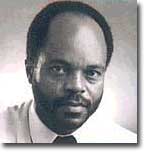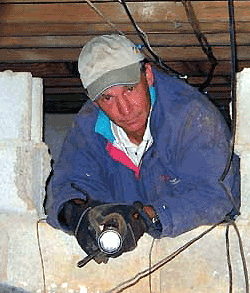|
An excerpt from John Head's book, "We Were the Land's"
But this was not about smart home-buying. It was about love. My love for this place was born in my childhood. There was no need to have the house inspected first. There was nothing that could be found that would dissuade me. I asked Dan Curl to do the inspection for me. Years before, someone had recommended Dan to me for another inspection job. I never got in touch with him about that, but I eventually met him on the tennis court, where he was both an elegant and tenacious player. We played fairly regularly for a while. Dan always won. I hadn't seen Dan for a while when I called him about inspecting the farmhouse. A heavy smoker, he had been diagnosed with throat cancer the year before and underwent chemotherapy. The treatment left him too weak to play tennis. He talked easily about his illness as we rode in my truck toward Jackson. "I'm feeling stronger," Dan said. "I'm almost to the point where I'm ready to start playing again. I've been working with the weights, trying to get some muscle tone back. But I go out on the court to hit some balls and the stamina just isn't quite there. "I just try to take things one step at a time and not to rush to do things. One thing having cancer has taught me is to be patient, not to try to do it all at once." I just listened. I didn't say what I was thinking, which was that it seemed to me that such a life-threatening illness would teach you to do as much as you can while you can. It would teach you to rush to get done as much as you can, because you never really know how long you have to do them. But the next moment I thought how foolish and self-centered I was being. Dan was the one who was suffering through the illness and fighting it. He's entitled to draw his own lessons from it without me offering my interpretation, which was completely uninformed by experience. By the time we arrived in Jackson, the topic of conversation had shifted from Dan to me. He looked around as we drove through town. "So, why did you buy your grandparents' farm?" he asked. "Are you getting sentimental over your hometown?" There's that question again. Why? Sentimentality over Jackson is not the answer. There's not that much left to be sentimental about here. Except for the short stretch through the heart of downtown, Jackson's main drag looks like a strip of road in suburbia, only on a smaller scale. Dan and I drove past a McDonald's, a Burger King, a Pizza Hut, a Chinese restaurant, a Kentucky Fried Chicken, three stop-and-shop gas station/convenience stores, a Piggly Wiggly grocery store and other businesses that were not there when I grew up in Jackson. Tom Wolfe's literary warning that you can never go home again isn't merely about whether the people back home will accept you. It's also about whether "home" will still be there waiting for you. The Jackson, Ga., I knew wasn't still there. It isn't just a superficial transformation brought on by the arrival of McDonald's and other franchises that make the town look a lot like every other town. It goes deeper than that. A drug house flourished across the street from my mother's home for months until the police finally busted it and the city boarded it up. Jackson was in the news recently as the center of an auto insurance scam, with several local residents arrested. The town is changing with the times, and so are the people. "No, I don't think it's sentiment," I said to Dan. "I just thought it was important to keep the place in the family." But even as I spoke those words, I knew there was more to it than that. * * * * * Dan Curl grabbed a flashlight, ready to probe dark and dusty places in order to tell me how to save the house. As we walked through and around the house he conducted a serious conversation with a micro-recorder, while addressing me in mostly light-hearted asides. "Electrical panel is not up to standard, with main lines exposed. Recommend replacement," he said into the recorder, before turning to me and adding, "Wow, this thing is old. It must have been one of the first switch boxes invented." [I would hear Dan use the phrases "not up to standard" and "recommend replacement" many times that day. They were repeated as often as refrains from disco songs.] "The house has a metal roof with extensive rusting," Dan told the recorder as we stood in the middle of a field and he peered at the roof through a pair of small binoculars. Noting patches of black amid the rust-brown, he said, "Repair patches indicates leaks in the past." Then, speaking to me as he continued to look through the binoculars, Dan said, "It may not look too good, but a tin roof can last forever. I'll bet we'll find some water damage but probably not a lot and probably not recent." When inside inspection confirmed that, Dan turned to me and said, "Am I good, or what?" He reminded me of a doctor with a good bedside manner making his rounds at a hospital: Tell the patients what's wrong, but be positive when you can. And don't take everything too seriously, especially yourself. Upstairs, Dan stood in the middle of the main bedroom, jumped up and stomped down with both feet several times. He moved the recorder close to his lips. "There's definite sloping of the floor from the center joist to the outside edges of the room. But there's little floor vibration." "Houses settle over the years," Dan told me. "I wouldn't worry too much about this unless we find something else." That "something else" was waiting for us in the kitchen downstairs. That barely noticeable gradual slope in the floor upstairs was more like a severe drop-off from the kitchen toward the back of the house. There was obvious water damage around the sink. Tin, plywood and particle board had been nailed down to cover some holes. Dan didn't bother to jump up and down to test for structural soundness. He might have gone right through the floor if he had tried that in the wrong place. "There's water damage here, but I'm afraid there might be more than that going on," Dan said as he kneeled down and looked under the sink. "It's not just a leak from the pipes. It looks like the whole floor is involved." It was worse in the bathroom. Daylight came through the wall near the base of the toilet. The floor had been covered with some kind of veneer paneling. It felt spongy with each step. There was a gap in the floor running along the bathtub. It was hard to say what law of physics held the tub in place. "Geez," was about all Dan had to say. We walked around to the back of the house. Something stopped Dan in this tracks. "Look at that," he said. "Look at what?" I asked. "That pipe running up the side of the house. It's the sewer vent pipe. It allows sewer gases to escape. Look at how it stops right at that bedroom window on the second floor. If the window is open, the gases will be vented into that room. That's not only a code violation; it's downright dangerous." Dan looked up and down the pipe. He shook his head a few more times before we crawled under the house to get a better look at the floor damage. Dan shone his flashlight from spot to spot, again shaking head. "You've got major problems here," he said. "Major structural problems. Looks like someone tried to make repairs, but I don't see that they did much good. Look at this joist they added here. It's not providing any support. It's sort of just hanging there. And these two-by-fours they used as connectors between the bad joists? What are those for? They don't do a thing as far as fixing the problem goes. And look at the way somebody nailed new wood to the rotten wood back there. That makes no sense." Dan was working himself toward indignation over the shoddy work. "This is actually dangerous," he said. "I wouldn't fill that tub with water, much less get into it. It's going to come through the floor one day." There was more head shaking, almost sorrowfully this time. "You need to get a structural guy in here to take a look," Dan said. "I know you've got a lot of water damage, lots of rot. And it there's evidence of termite activity. That main beam over there is pretty much gone. Somebody can take a close look and tell you what can be done to fix it. But I'd guess you're looking at jacking up the house and doing foundation work. You can really get into some money doing that." The day had turned even more dreary by the time we crawled from under the house. The drizzle was heavier, the sky grayer. "Well," I said to Dan, "what do you think I should do? Is it worth putting the work into it?" "That's up to you, John. The house was what your grandfather wanted it to be. It served the purpose he intended for it. But basically it's just a big old barn of a house. If you want to make it into something else and bring it up to today's standards, it's going to take time and money to do it. You're the only one who knows what that's worth to you, how much you're willing to spend on it." That answer made me feel uneasy. It didn't matter much what Dan thought. I was already set on restoring the house. I really shouldn't have asked the question. But having asked it, I felt compelled to press on. "Dan, I'd just like to know what you'd do in my place. What would you do if this was your house?" "It's not my house, John." "I just want you professional opinion, Dan. I'm not putting the rest of my life in your hands. I'll consider what you say, but the decision is going to be mine, not yours." Dan hesitated, and then he looked away. He looked like the upbeat doctor who finally had to face the family of a patient who was not going to get better, ever. He turned back and looked me in the eye. Then I realized that what he had to say was even worse than I thought. I had seen him talking into the recorder like a doctor making a diagnosis, trying to gather enough information about the patient's illness to prescribe a cure. Perhaps things started that way. At some point, however, the doctor making a diagnosis became the coroner conducting an autopsy. "If this was my house," Dan said, "I'd tear it down." * * * * * Dan Curl pulled his punches in person, but not on paper. The summary of his inspection of the farm house was as direct as a Muhammad Ali left jab, and just as stinging.
Nothing distinctive about it at all, I thought bitterly, except that it was the first and only house my grandparents ever owned, the place from which they sent their children - including my mother - out into the world. But I really had no reason to be angry. I asked Dan to be honest with me. He was. The physician analogy is apt again. A doctor who tells you that someone you love has a life-threatening illness hasn't caused the disease. A doctor who lies and says everything is fine hasn't cured it. Dan told me that everything was not well with the house, and he gave me the prescription for treating its ills.
Other than that, the place was in mint condition. While Dan gave no encouragement to my dream of restoring the house, he was cautious in his pessimism. His recommendation didn't mention the potential problems with the foundation, even though that was what Dan was most worried about during the inspection. I'm sure there are times when doctors in general practice are relieved that their training limits just how definitive they can be in diagnosing the most devastating illnesses. Much like the family doctor, Dan was leaving the job of delivering the really bad news to a specialist. Dan also tried to gently inject a little realism into my dream when I told him I hoped to do most of the restoration work myself. "For a job like that, you need to know what you're doing," Dan said. "I'm not saying you can't do it. You'd just be better off at least having advice from a contractor. The best thing would be to spend two or three years apprenticing with somebody. Then you'd be qualified to do it all yourself." "I don't want to take two or three years, Dan. I'd like to have it done by the end of this year. I think I can." "What's your hurry?" Dan asked. "It's not like you don't have any place to live and have to move into this house as soon as possible. You've got to have some patience."
In the late fall of '97 John asked me to inspect his grandparent's farmhouse in Jackson, Georgia. John's words describing my character and presentation of the inspection findings are valid, they've been echoed by other clients. John and I still play an occasional game of tennis and I still win, most of the time. John is "almost" finished with the house. |
|

![[Image]](WeAreTheLandCover.jpg)


